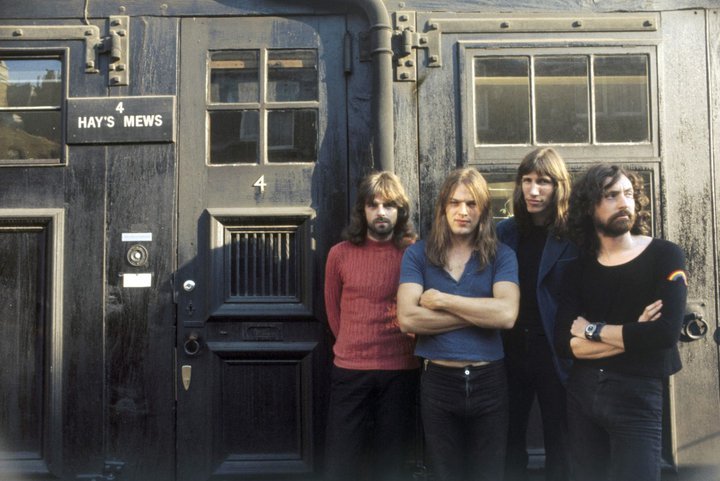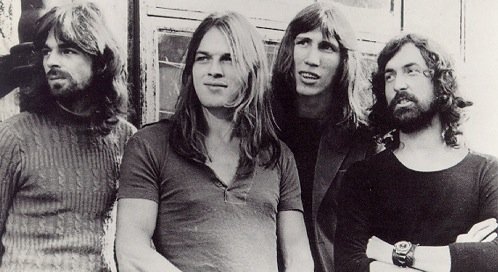Released in October 1970, Pink Floyd’s “Atom Heart Mother” stands as a significant, albeit often overshadowed, entry in the band’s discography. Nestled between the pastoral psychedelia of “Ummagumma” and the conceptual brilliance of “Meddle,” this album marks a pivotal moment in Pink Floyd’s evolution from a quirky, underground act into one of the most influential progressive rock bands in history.
The music landscape at the time was rich with experimentation. Bands like The Beatles, The Who, and The Rolling Stones were pushing the boundaries of rock music, infusing it with eclectic influences and complex arrangements. Within this context, “Atom Heart Mother” emerged as a bold statement, reflecting Pink Floyd’s desire to explore and expand their sonic horizons.
Artistic Intentions
Artistic intentions for “Atom Heart Mother” were ambitious. The band aimed to create a piece that blended orchestral music with rock, a concept that was quite avant-garde for the time. This is most evident in the album’s title track, a 23-minute suite that incorporates a brass band and choir, melding classical influences with psychedelic rock. In various interviews, the band members, particularly Roger Waters and David Gilmour, have spoken about their intent to break away from conventional rock structures and craft something that was both symphonic and experimental.
“Atom Heart Mother” was also a response to the growing complexity of rock music production. The band collaborated with composer Ron Geesin, whose avant-garde leanings helped shape the album’s distinctive sound. Geesin’s involvement was crucial in realizing the band’s vision, particularly in orchestrating the intricate arrangements that define the title suite.
Sonic Exploration

“Atom Heart Mother” is a testament to Pink Floyd’s sonic adventurousness and their keen attention to production quality. The album was recorded at Abbey Road Studios, a location synonymous with high production standards. As a result, the production values on this album are notably sophisticated. The sound is neither overly polished nor deliberately lo-fi; instead, it strikes a balance that allows the complexity of the arrangements to shine through while maintaining an organic warmth. This nuanced production style enhances the album’s thematic exploration of blending classical and rock elements.
The title track, “Atom Heart Mother Suite,” exemplifies the album’s intricate musical arrangements. The suite is divided into several movements, each showcasing a different facet of Pink Floyd’s compositional prowess. The use of a brass section and choir, arranged by Ron Geesin, is particularly innovative. The brass adds a bold, almost cinematic quality to the music, while the choir brings an ethereal, otherworldly dimension. These elements are meticulously layered with the band’s traditional rock instrumentation, creating a rich tapestry of sound that is both grandiose and immersive.
Vocally, the album takes a somewhat minimalist approach. The vocals are sparse, often serving more as another texture within the music rather than the focal point. When present, the vocals are delivered with a restrained intensity that complements the album’s atmospheric and experimental nature. For instance, the serene vocals in “If” contrast sharply with the chaotic instrumental interludes of the title suite, highlighting the band’s dynamic range.
Genre Elements
Genre-wise, “Atom Heart Mother” is a melting pot of influences. It firmly situates itself within the progressive rock genre while drawing heavily from classical music traditions. The album also touches upon psychedelic rock, a hallmark of Pink Floyd’s earlier work, particularly in tracks like “Alan’s Psychedelic Breakfast,” which features whimsical sound effects and an unconventional structure. This blending of genres was quite novel at the time, showcasing the band’s ability to transcend traditional rock boundaries and venture into uncharted musical territories.
Moreover, the album’s willingness to experiment with form and instrumentation foreshadows the band’s future endeavors. The genre-blending seen here would later become a defining characteristic of their work, especially in concept albums like “The Dark Side of the Moon” and “Wish You Were Here.” “Atom Heart Mother” stands as a pivotal moment where Pink Floyd’s sonic exploration laid the groundwork for their evolution into one of the most innovative and influential bands in rock history.
Lyrical Analysis

“Atom Heart Mother” is often noted more for its instrumental and compositional innovation than for its lyrical content. Nevertheless, the lyrics present on the album contribute significantly to its thematic depth and emotional resonance.
Themes and Messages
The central themes of “Atom Heart Mother” revolve around introspection, existential musings, and the quotidian aspects of life. These themes are subtly woven into the fabric of the album through the lyrics, complementing the expansive musical landscapes.
Introspection and Isolation: In the song “If,” Roger Waters’ lyrics delve into themes of solitude and self-reflection. Lines like “If I were a swan, I’d be gone / If I were a train, I’d be late” express a sense of disconnection and longing for escape. This theme of isolation is a recurring motif in Waters’ writing, prefiguring more elaborate explorations in later works like “The Wall.”
Ordinary Life: “Alan’s Psychedelic Breakfast” is a whimsical track that juxtaposes mundane morning routines with surreal soundscapes. The lyrics and dialogue snippets provide a snapshot of daily life, infused with a sense of gentle absurdity. The breakfast sounds and casual conversation serve as a reminder of the simplicity and repetitiveness of everyday existence, offering a counterpoint to the album’s more grandiose moments.
Lyrical Depth
The lyrics on “Atom Heart Mother” are relatively straightforward, yet they possess a certain poetic quality. Unlike the abstract and often cryptic lyrics found in some of Pink Floyd’s later work, the lyrics here are more direct and narrative. This simplicity does not diminish their impact; rather, it grounds the album’s more experimental elements in human experience.
For example, the lyrics in “If” are imbued with a quiet melancholy, conveyed through plain yet evocative language. The song’s contemplative nature invites listeners to ponder their own feelings of isolation and desire for connection. In contrast, the dialogue in “Alan’s Psychedelic Breakfast” is mundane and almost banal, yet it captures a slice of life with authenticity and charm.
Emotional Impact
The lyrics of “Atom Heart Mother” contribute to the album’s emotional landscape by evoking a range of feelings from contemplation to whimsy.
Empathy and Contemplation: The introspective nature of “If” elicits empathy and a sense of shared human experience. Waters’ candid expression of vulnerability and uncertainty resonates with listeners, fostering a contemplative mood.
Whimsy and Absurdity: “Alan’s Psychedelic Breakfast” adds a touch of humor and absurdity to the album. The mundane act of preparing and eating breakfast, set against a backdrop of psychedelic sounds, creates a surreal yet relatable experience. This track lightens the album’s overall tone, providing a playful counterbalance to its more serious themes.
Cohesion and Flow

“Atom Heart Mother” is an album that thrives on its ambition to blend diverse musical elements into a unified whole. The cohesion and flow of the album are critical in understanding its place within Pink Floyd’s discography, as well as its impact on the listener.
Track Progression
The album opens with the grandiose “Atom Heart Mother Suite,” a multi-part epic that sets the tone for the rest of the record. This 23-minute piece is divided into six distinct sections, each flowing seamlessly into the next. The suite’s orchestral and rock elements are woven together with precision, creating a dynamic and immersive listening experience. The transitions between the sections are handled with care, ensuring that the listener is carried along on a cohesive musical journey.
Following the suite, the album shifts to more intimate and introspective tracks. “If,” a reflective and melancholic song, provides a stark contrast to the grandeur of the opening piece. This transition works well, as it allows the listener to decompress and engage with the more personal and contemplative side of Pink Floyd.
“Summer ’68,” written by Richard Wright, brings a different flavor to the album with its upbeat melody and nostalgic lyrics. The track serves as a bridge between the introspective “If” and the whimsical “Alan’s Psychedelic Breakfast.” The upbeat yet reflective tone of “Summer ’68” maintains the album’s flow, preventing any jarring shifts in mood.
The final track, “Alan’s Psychedelic Breakfast,” is a unique blend of music and sound effects that encapsulates the experimental spirit of the album. The track’s structure, with its alternating segments of dialogue, everyday sounds, and musical interludes, ties back to the suite’s multifaceted nature, creating a sense of thematic and sonic continuity.
Thematic Consistency
The themes of introspection, daily life, and musical experimentation are consistently maintained throughout “Atom Heart Mother.” While the album explores different musical styles and moods, the underlying themes provide a cohesive thread that ties the tracks together.
The orchestral and rock fusion in the title suite sets a thematic precedent for the rest of the album. This fusion is echoed in the smaller-scale experimentation seen in “Alan’s Psychedelic Breakfast,” where mundane sounds are elevated to a form of art through their juxtaposition with music. The introspective nature of “If” and the nostalgic reflection of “Summer ’68” further underscore the album’s thematic focus on personal and existential musings.
The styles and emotions are also carefully balanced. While the suite is grand and complex, the following tracks offer a more stripped-down and intimate experience. This balance prevents the album from feeling disjointed, despite its diverse musical approaches. The shifts in style are executed with an understanding of pacing and emotional resonance, ensuring that the album feels like a cohesive and well-rounded work.
Standout Tracks and Moments

“Atom Heart Mother” is an album rich with highlights that showcase Pink Floyd’s innovative spirit and musical prowess. Several tracks and moments stand out for their artistic merit, innovation, and emotional impact, cementing the album’s place as a landmark in progressive rock.
Highlight Key Tracks
“Atom Heart Mother Suite” The title suite is undoubtedly the centerpiece of the album, spanning over 23 minutes of orchestral rock fusion. Its ambitious structure and intricate arrangements set it apart as a groundbreaking work in the band’s catalog. The suite’s seamless integration of classical elements, such as the brass section and choir, with Pink Floyd’s psychedelic rock foundation demonstrates their willingness to push musical boundaries. Each of its six movements offers a unique sonic experience, from the majestic opening to the serene pastoral interludes and the intense, almost chaotic crescendos.
“If” This track is a stark departure from the grandiosity of the suite, offering a minimalist, introspective experience. Roger Waters’ poignant lyrics and gentle acoustic guitar create an intimate atmosphere that resonates with listeners on a personal level. The simplicity and emotional depth of “If” highlight Waters’ lyrical talent and ability to convey complex emotions through straightforward yet evocative language.
“Summer ’68” Written and sung by Richard Wright, “Summer ’68” is a vibrant and melodic piece that blends upbeat pop sensibilities with reflective lyrics. The song’s lush instrumentation, including piano and brass, coupled with Wright’s warm vocal delivery, creates a sense of nostalgia and introspection. The track’s juxtaposition of cheerful melodies and wistful themes sets it apart as a standout moment on the album.
“Alan’s Psychedelic Breakfast” This track epitomizes Pink Floyd’s experimental edge. It combines everyday sounds of breakfast preparation with musical passages, creating a whimsical and surreal listening experience. The track’s structure, featuring segments like “Rise and Shine,” “Sunny Side Up,” and “Morning Glory,” provides a unique auditory journey that blurs the lines between reality and psychedelia.
Memorable Moments
Opening Brass Fanfares of the Suite The album opens with a powerful brass fanfare in the “Atom Heart Mother Suite,” immediately setting a grand and majestic tone. This moment captures the listener’s attention and signals the ambitious scope of the piece, blending classical grandeur with rock energy.
Ethereal Choir Sections Throughout the “Atom Heart Mother Suite,” the use of a choir adds an otherworldly quality to the music. These sections, particularly in the movements “Breast Milky” and “Mother Fore,” enhance the suite’s emotional depth and create a hauntingly beautiful atmosphere.
Reflective Lyrics of “If” The lines “If I were a good man, I’d understand the spaces between friends” from “If” are particularly poignant. Waters’ introspective lyrics and gentle delivery evoke a deep sense of empathy and contemplation, showcasing his ability to connect with listeners on a human level.
Playful Sound Effects in “Alan’s Psychedelic Breakfast” The sounds of frying bacon, pouring milk, and casual conversation in “Alan’s Psychedelic Breakfast” create a vivid soundscape that immerses the listener in a surreal yet familiar environment. These playful sound effects, combined with the serene musical interludes, highlight Pink Floyd’s knack for blending everyday life with psychedelic elements.
Piano Break in “Summer ’68” The instrumental break in “Summer ’68,” featuring Richard Wright’s piano, is a standout moment of musical beauty. This section captures the song’s bittersweet nostalgia and exemplifies Wright’s skill as a composer and musician.
Artistic Contribution and Innovation

“Atom Heart Mother” occupies a significant place in the landscape of progressive rock and the broader music industry of the early 1970s. It stands as a testament to Pink Floyd’s boundary-pushing creativity and their willingness to experiment with the conventions of rock music.
Place in Genre/Industry
Within the progressive rock genre, “Atom Heart Mother” is a pivotal work that helped define the genre’s expansive and experimental ethos. Progressive rock was characterized by its ambition to transcend the limitations of traditional rock, incorporating elements from classical, jazz, and electronic music. Pink Floyd, already known for their psychedelic influences, embraced this ethos wholeheartedly with “Atom Heart Mother.”
The album’s release in 1970 positioned it among other groundbreaking works of the era, such as King Crimson’s “In the Court of the Crimson King” and Yes’s “The Yes Album.” These albums collectively pushed the boundaries of rock music, challenging listeners to accept longer compositions, complex arrangements, and thematic depth. “Atom Heart Mother” contributed to this movement by integrating orchestral and choral elements in a rock context, something that was relatively novel at the time.
In the broader music industry, the album demonstrated that rock bands could successfully collaborate with classical musicians and composers, paving the way for future genre-blending projects. It also showcased Pink Floyd’s potential for creating conceptual, album-length pieces, a direction they would further explore in their later masterpieces.
Innovation
“Atom Heart Mother” is rich with innovative aspects that underscore Pink Floyd’s role as pioneers in rock music. Several elements stand out as particularly fresh and groundbreaking:
Orchestral and Choral Integration
The title suite’s use of a full brass section and choir, arranged by Ron Geesin, was a bold and innovative move. While rock bands had occasionally flirted with orchestral elements, Pink Floyd fully embraced this integration, creating a symphonic rock piece that melded the grandeur of classical music with the raw energy of rock. This fusion was not just a superficial layering but a thoughtful blending that created a seamless and cohesive work.
Extended Composition
The “Atom Heart Mother Suite” itself is a hallmark of innovation, being one of the earliest examples of a rock band dedicating an entire album side to a single, multi-part composition. This extended format allowed for deeper musical exploration and thematic development, influencing future progressive rock epics like Genesis’ “Supper’s Ready” and Yes’s “Close to the Edge.”
Sound Collage Techniques
“Alan’s Psychedelic Breakfast” employs sound collage techniques that were ahead of their time. The incorporation of everyday sounds and dialogue into the music not only created a unique listening experience but also expanded the possibilities of what could be considered musical. This approach would later be echoed in the experimental works of artists like Brian Eno and The Beatles’ “Revolution 9.”
Thematic and Sonic Experimentation
The album’s willingness to experiment with both themes and sound set it apart from contemporaneous releases. Tracks like “If” and “Summer ’68” explored personal and existential themes with a lyrical directness that contrasted with the more abstract and instrumental-heavy title suite. This thematic diversity, coupled with the album’s sonic experimentation, showcased Pink Floyd’s versatility and commitment to pushing artistic boundaries.
Production Techniques
Recorded at the legendary Abbey Road Studios, the production quality of “Atom Heart Mother” was exemplary. The album utilized advanced studio techniques to achieve its rich and layered sound. The meticulous attention to detail in the mixing and recording process ensured that the complex arrangements were presented with clarity and depth, setting a high standard for production in rock music.
Closing Thoughts

“Atom Heart Mother” is a fascinating and ambitious work that captures a pivotal moment in Pink Floyd’s career. The album’s strengths lie in its innovative approach to genre blending, its complex and rich musical arrangements, and its willingness to push the boundaries of rock music. The “Atom Heart Mother Suite” stands out as a landmark composition, showcasing the band’s ability to merge classical elements with rock in a cohesive and compelling manner. Tracks like “If” and “Summer ’68” provide emotional depth and lyrical introspection, while “Alan’s Psychedelic Breakfast” highlights Pink Floyd’s playful experimental side.
However, the album is not without its weaknesses. Some listeners might find the extended suite challenging and perhaps overly ambitious, and the experimental nature of “Alan’s Psychedelic Breakfast” may come off as disjointed to those who prefer more traditional song structures. Additionally, while the integration of orchestral elements is impressive, it can at times overshadow the band’s core rock sound, making the album feel like a departure rather than a continuation of their previous work.
Place Within Discography
In the context of Pink Floyd’s discography, “Atom Heart Mother” is a crucial stepping stone that paved the way for their later masterpieces. It represents a period of exploration and growth, where the band was willing to take risks and experiment with new ideas. This willingness to innovate is what ultimately led to their iconic albums like “The Dark Side of the Moon” and “Wish You Were Here.”
The album’s impact on listeners varies; those with an appreciation for experimental and progressive rock will find much to admire, while others might see it as an intriguing yet imperfect precursor to the band’s more polished later works. Its place in the music industry is significant, as it helped to expand the possibilities of rock music and inspired future generations of musicians to think outside the conventional bounds of the genre.
Official Rating
“Atom Heart Mother” earns a solid 6 out of 10. This rating reflects its status as an important and innovative album that, despite its imperfections, showcases Pink Floyd’s bold artistic vision. The strengths of the album—its ambitious compositions, thematic depth, and experimental spirit—are balanced by its occasional unevenness and moments of overreach. Ultimately, it remains a significant and influential piece in Pink Floyd’s evolution, worthy of recognition and appreciation for its role in shaping the future of progressive rock.
